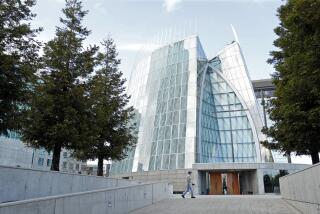Detroit Prelate Backs Plan to Close 43 Churches
- Share via
DETROIT — Saving historic church buildings is less important than keeping the parish life within them strong, Cardinal Edmund C. Szoka said in defense of a bold plan to close 43 Roman Catholic churches in the city.
Despite protests in the two weeks since the recommendations were made to shut down more than one-third of the city’s church buildings, the archbishop of Detroit predicted this week that parishioners’ unhappiness with the planned closings would decrease.
“As people have time to think about this and to consider it, they’ll understand that what we’re trying to do is to strengthen the life of the parishes, strengthen the presence of the church in the city,” Szoka said.
Not Needed Today
“That’s always been our objective. We can’t confuse that with simply maintaining a lot of great big buildings that once served a purpose but today are not needed.”
A preservationist said many of the structures deserved to be saved as landmarks, even if not as houses of worship.
“I would say throughout the Northeast and the Midwest, there is a widespread recognition that the Roman Catholic Church especially cannot afford to keep that number of buildings,” Holly Fiala said.
Fiala, Midwest director of the Chicago-based National Trust for Historic Preservation, and other representatives of local, state and federal preservation agencies, met in Detroit on Monday to discuss the historic significance of churches the Archdiocese of Detroit plans to close.
“Some of these are very great energy-using buildings, and the population that supports them has been reduced,” Fiala said. “For the large barns of buildings meant to house 4,000 parishioners and that now have 400, it’s a real problem.”
As many as half of the 43 threatened churches may be eligible for designation as landmarks under Detroit’s historic landmark ordinance, said William M. Worden, staff director of Detroit’s Historic Designation Advisory Board.
The historic designation would restrict interior and exterior renovations, he said. State and national historic designations are also possible, a status already attained by 10 of the affected buildings.
“It may delay the demolition of the building or its conversion to an alternate use . . . but it will not keep their parish alive,” Fiala said. “That is something separate and apart from what the designation can achieve. It basically protects the building itself, but it doesn’t protect what happens inside. That is a local issue.”
Church observers said they believe that the plan would represent the largest wave of church closings ever to hit a single metropolitan area in the United States.
Instead of maintaining 112 parishes, the panel is recommending that Detroit and two small metropolitan areas within its boundaries--Highland Park and Hamtramck--operate only two-thirds of the parishes, along with four missions and two shrines.
Cardinal Szoka is scheduled to make final decisions on which parishes would finally close by the first week of January, after diocesan hearings this month and next.
Szoka suggested that the proposed closing of churches is “not necessarily unique” to the Detroit archdiocese. “Parishes and schools in almost every large American city have encountered the same struggle--an aging and poor population, heavy out-migration to the suburbs and sharply reduced resources compounded by an ever-increasing cost factor,” he said.
The Detroit Archdiocese estimated that the proposed closures would result in the displacement of about 10,000 worshipers. Spokesmen said the archdiocese has provided $25 million in grants over the last several years to cover debt payments for Catholic schools and parishes in Detroit.
Members of the Detroit Catholic Pastoral Alliance vowed to fight the closings with protests and fasts and called upon parish leaders to refuse to close or merge churches.
Father Norman Thomas, past chairman of the Catholic Pastoral Alliance, said that “money has never really been a big problem” and suggested that parishes could be kept open if sacrifices were made.
“Instead of heating a big church building all week long you hold Mass somewhere else, in a smaller room,” he said.
More to Read
Sign up for Essential California
The most important California stories and recommendations in your inbox every morning.
You may occasionally receive promotional content from the Los Angeles Times.












